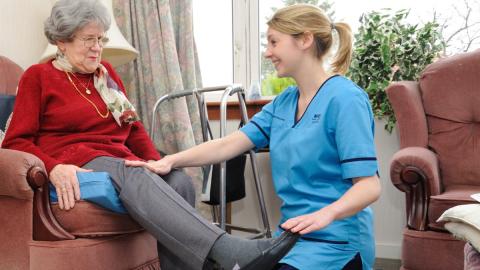CSP members in Scotland have spoken out about the real pressures they are facing in the NHS, and the impact on physiotherapy services.
98% of Scottish CSP members told us that the current staffing levels of the services in which they work are not adequate to meet patients’ needs.
The findings of this survey should send urgent alarm bells ringing for the Scottish Government. The evidence is overwhelming: Scotland’s physiotherapy services are in crisis, with severe consequences for both patients and staff.
Workforce gaps threaten the impact of increased NHS funding
The root cause of this crisis is clear: the growing demand for physiotherapy (from an ageing population, additional new roles in primary care, and increasing need for community rehabilitation) has been met with underinvestment in the physiotherapy workforce.
Scottish government announced last week an increase to £21billion in total NHS funding. Without a workforce plan that enables physiotherapy and community rehab services in Scotland to meet population need, this money will continue to deliver a system unequipped to truly make Scotland healthier.
If the Scottish Government fails to act now, patient care will continue to decline, and NHS staff will face increased burnout, driving further workforce attrition and making the crisis even more acute.
Discharge to sink or swim
The impact of this workforce crisis on patients is stark. CSP members told us of patients facing longer waiting times, escalating pain, worsening disability, and dire consequences for mental health.
Currently patients are routinely having to wait for more than 12 weeks to access rehabilitation services in the community. These delays are not just frustrating for patients—they are dangerous. As one physiotherapist put it:
“We basically discharge to sink or swim. Unfortunately, this results in a high amount of the patients who could have had a successful outcome needing to be readmitted due to a fall or difficulty coping at home.”
Without sufficient physiotherapy staffing, we see an increase in costly re-admissions, as patients who could have avoided falls or complications are forced to navigate recovery without the necessary support.
Alongside this, the number of people waiting for musculoskeletal physiotherapy in Scotland has grown from around 25,000 in January 2021 to more than 63,000 in March 2024. That’s nearly 40,000 more people waiting in pain, less likely to be able to work. A physiotherapy workforce adequately sized to meet population need could tackle this growing crisis- making Scotland healthier.
No longer time to provide care patients deserve
This is taking a heavy emotional toll on CSP members who went into the physiotherapy profession to help people. One in five say they no longer have enough time or resources to provide the care their patients deserve. They told us that the increasing pressures they are facing due to the staffing crisis have caused them to experience mental and physical ill-health. As a result, some physios have called it quits, and many are seriously considering leaving.
What needs to happen
Over the past decade there has been no growth in the number of undergraduate training places for physiotherapy in Scotland, which is contributing to an insufficient number of graduates entering the NHS workforce. In stark contrast, England has seen its number of undergraduate training places double in the same period. While NHS England has already invested in over 400 physiotherapy apprenticeships, Scotland has yet to establish such a model.
The number of prospective students in Scotland wanting to enter the physiotherapy profession remains buoyant. Every course is over-subscribed with a ten to one ratio of applicants to enrollments.
We need a comprehensive physiotherapy workforce expansion plan from the Scottish Government. This should include increasing funded undergraduate training places for Scottish students and creating new "earn and learn" pathways into the profession. Extending the MSc physiotherapy health board bursary for Scottish-domiciled students beyond 2025 would also help increase graduate numbers—provided these places are additional to the undergraduate cohort.
We can no longer afford to wait. We need action and leadership from the Scottish government to ensure physiotherapy has the workforce it needs to thrive. By investing in physiotherapy training today and building on roles in prevention and in primary and community care, we can build a healthcare system that is sustainable and better equipped to meet the health needs of Scotland’s population for the years to come.
Kenryck Lloyd-Jones is the CSP's Public Affairs and Policy Officer for Scotland.
Listen to an excerpt of Kenryck's interview from BBC's Good Morning Scotland.
Number of subscribers: 1



